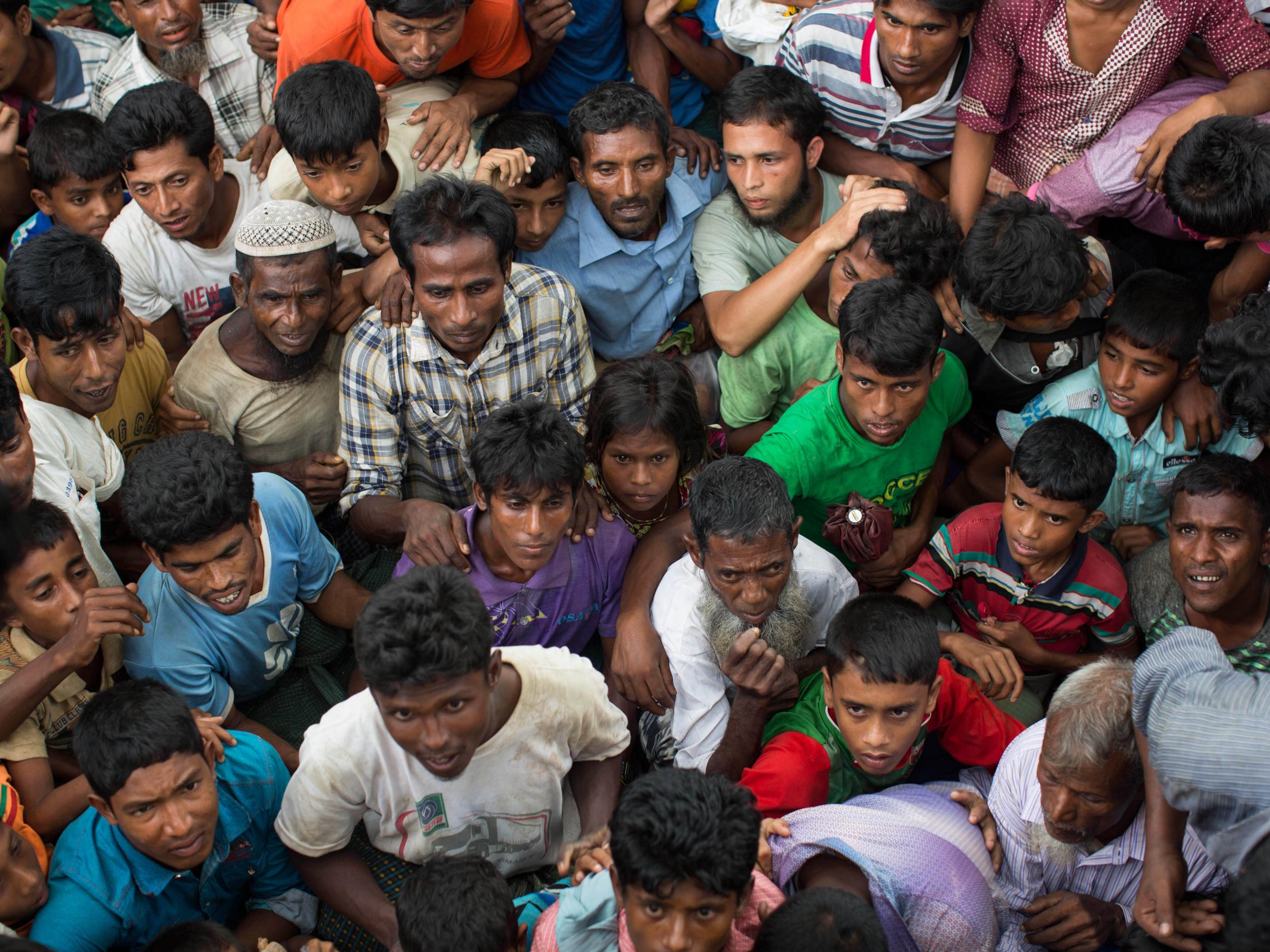DSEI 2017: Michael Fallon refuses to say if UK will stop training Burmese military amid Rohingya Muslim 'ethnic cleansing'
Defence Secretary tells arms fair delegates all training kept 'under review'

Your support helps us to tell the story
From reproductive rights to climate change to Big Tech, The Independent is on the ground when the story is developing. Whether it's investigating the financials of Elon Musk's pro-Trump PAC or producing our latest documentary, 'The A Word', which shines a light on the American women fighting for reproductive rights, we know how important it is to parse out the facts from the messaging.
At such a critical moment in US history, we need reporters on the ground. Your donation allows us to keep sending journalists to speak to both sides of the story.
The Independent is trusted by Americans across the entire political spectrum. And unlike many other quality news outlets, we choose not to lock Americans out of our reporting and analysis with paywalls. We believe quality journalism should be available to everyone, paid for by those who can afford it.
Your support makes all the difference.Sir Michael Fallon has refused to say whether Britain will stop training Burma’s armed forces amid allegations of “textbook ethnic cleansing”.
The United Nations said the Burmese army was accused of driving Rohingya Muslims out of Rakhine state, killing civilians and burning their homes to the ground.
But the UK has not announced any move to review training provided for the country’s military, despite calls to suspend the programme from 157 MPs and peers.
Asked whether the relationship had become uncomfortable, Sir Michael did not confirm any changes were taking place.
Speaking at the Defence and Security Equipment International (DSEI) event in London – the world’s biggest arms fair – he said the violence against Rohingya Muslims was “obviously unacceptable”.
“Our ambassador has made representations to that effect to the Burmese regime,” the Defence Secretary added.
“Like the arms that we export to any country, the training that we provide has to meet our criteria and is kept consistently under review.”
His comments came a day after Liam Fox, the International Trade Secretary, defended Britain's weapons sales to countries accused of committing war crimes, including Saudi Arabia.
The initiative in Burma does not include combat training but instead seeks to educate soldiers in democracy, leadership and the English language, cost the UK around £305,000 last year.
In November, then-defence minister Mike Penning said the Government does not know if any of the soldiers trained by the UK were involved in operations against Rohingya Muslims, adding that officials have not evaluated how the training has led to improvements in human rights.
World leaders have made appeals to Aung San Suu Kyi – a Nobel Peace Prize laureate – but she is still considered an ally by the British Government.
Boris Johnson was criticised for a “gushing” statement to the Burmese leader last week, where he called her “one of the most inspiring figures of our age”.
The Foreign Secretary added: “But the treatment of the Rohingya is alas besmirching the reputation of Burma.
“She faces huge challenges in modernising her country. I hope she can now use all her remarkable qualities to unite her country, to stop the violence and to end the prejudice that afflicts both Muslims and other communities in Rakhine.
“It is vital that she receives the support of the Burmese military, and that her attempts at peacemaking are not frustrated. She and all in Burma will have our full support in this.”
Burmese authorities have accused the Rohingya of destroying their own villages and claimed the “security operations” are a legitimate crackdown on militants who attacked security checkpoints last month.
But the UN High Commissioner for Human Rights said the “brutal” campaign was “clearly disproportionate and without regard for basic principles of international law”.
Zeid Ra’ad al-Hussein dismissed the government’s claims as a “complete denial of reality”, which he said was doing “great damage to the international standing” of the government.
He told the United Nations Human Rights Council in Geneva that more than 270,000 people had fled to Bangladesh, with more trapped on the border, amid reports of the burning of villages and extrajudicial killings.
“I call on the government to end its current cruel military operation, with accountability for all violations that have occurred, and to reverse the pattern of severe and widespread discrimination against the Rohingya population,” he added. “The situation seems a textbook example of ethnic cleansing.”
Mr al-Hussein said he warned last year that the pattern of “gross violations” against Rohingya suggested a systematic attack that could amount to crimes against humanity, but that the lack of access for investigators meant the current situation could not be fully assessed.
Human rights organisations have been warning over the plight of the ethnic minority for decades amid worsening persecution.
The Burmese government has long considered Rohingyas to be foreign nationals from Bangladesh, denying them citizenship and leaving them at the mercy of systematic abuse including restrictions on freedom of movement, work, privacy, marriage and access to basic health services and education.
Join our commenting forum
Join thought-provoking conversations, follow other Independent readers and see their replies
Comments